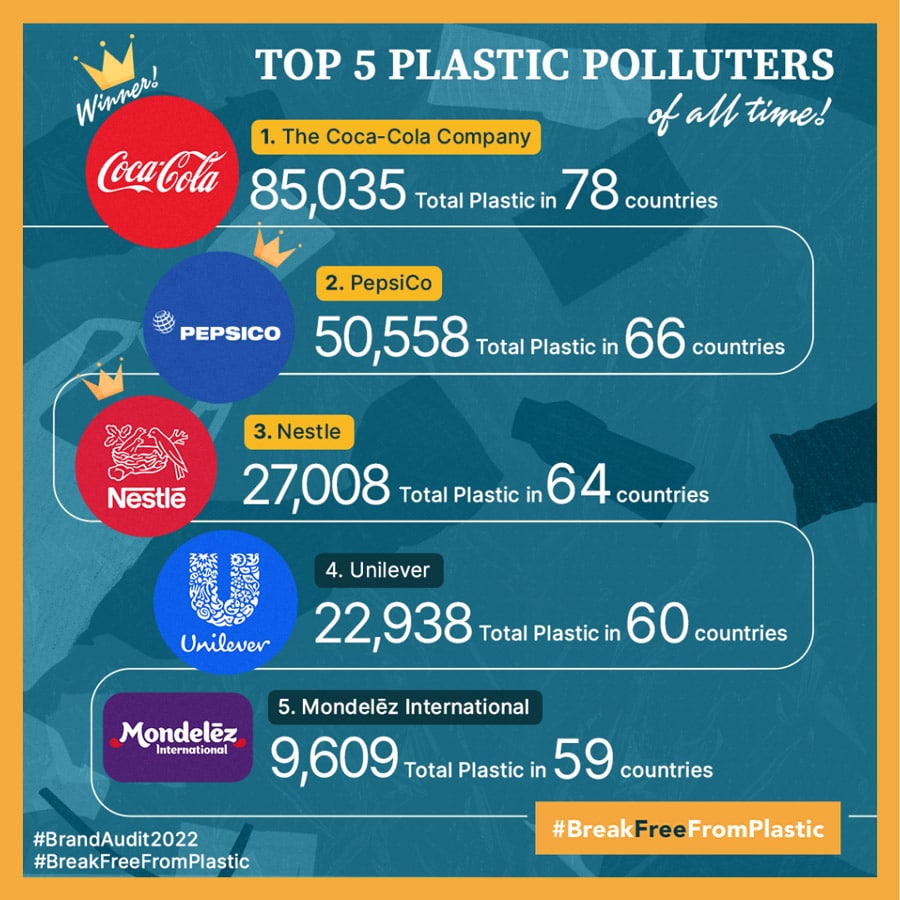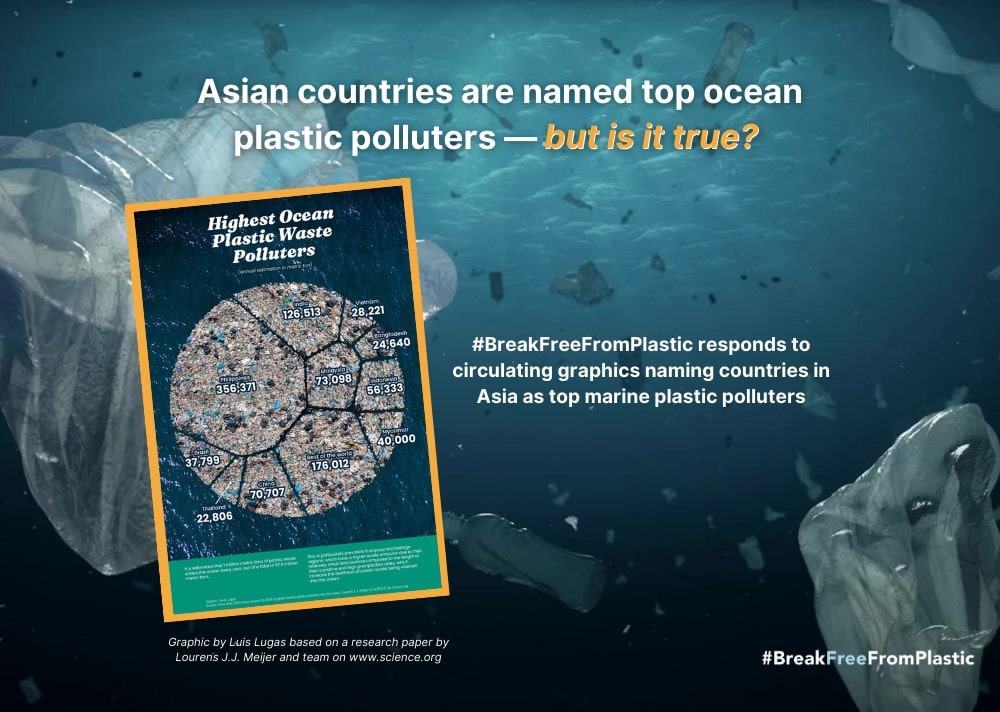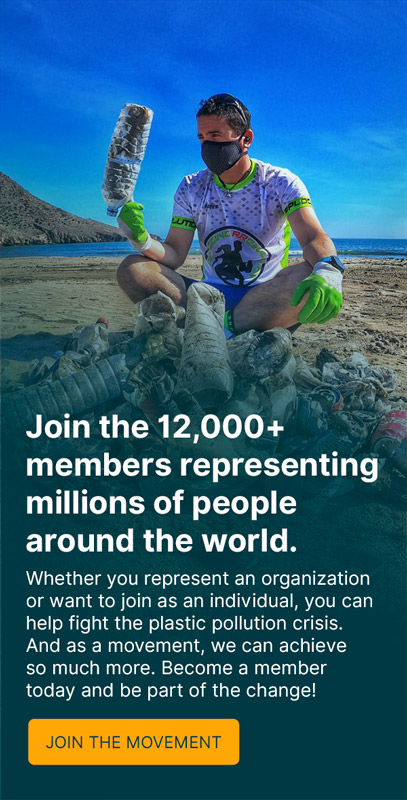#BreakFreeFromPlastic responds to circulating graphics naming countries in Asia as top marine plastic polluters
Manila, Philippines—Over the past couple of days, a misleading graphic on marine plastic pollution has been circulating on social media. The visual material, based on a 2021 research paper by Lourens J.J. Meijer (formerly, with The Ocean Cleanup) and team, presents several Asian countries as top contributors to ocean plastic wastes without context and acknowledgment of what creates this scenario. This harks back to the false narrative that #BreakFreeFromPlastic members countered for several years, finally leading to the retraction and apology from Ocean Conservancy in 2022 for their report that presented Asian countries as top ocean plastic polluters and promoted false solutions. Since then, BFFP member Global Alliance for Incinerator Alternatives (GAIA) has been stewarding a process of restorative justice with movement leaders in the Philippines, Indonesia, Viet Nam, and other Asian countries.
“We failed to confront the root causes of plastic waste or incorporate the effects on the communities and NGOs working on the ground in the places most impacted by plastic pollution,” said Ocean Conservancy in its retraction. “...by focusing so narrowly on one region of the world (East and Southeast Asia), we created a narrative about who is responsible for the ocean plastic pollution crisis – one that failed to acknowledge the outsized role that developed countries, especially the United States, have played and continue to play in generating and exporting plastic waste to this very region.”
It is imperative to recognise that plastic pollutes across its lifecycle—from extraction of fossil fuels to manufacturing of single-use plastics, as well as polluting disposal technologies, and Global North countries dumping waste in Asia, Africa and Latin America. Annual brand audits around the world have consistently shown the same top corporate plastic polluters globally. Corporations must take accountability for the single-use plastics they produce which end up polluting the environment and harming human health. Perpetuating the misleading framing that countries in Asia are the main contributors to plastic pollution in the oceans distracts from the real causes of plastic pollution as well as the solutions we need.

Brand Audit 2022 Top Polluters
"Developed nations have been shifting their responsibility for waste management to under-resourced nations," said Mageswari Sangaralingam of Consumers' Association of Penang (Malaysia). "Besides dealing with our own waste, we now have to manage other people's waste which potentially leads to leakage into the environment. Plastic pollution does not respect borders. We must end waste colonialism, and stop injustice."
"Exporting plastic wastes to countries in Asia is just another form of colonialism, harming the most vulnerable communities," said Aileen Lucero, National Coordinator of Ecowaste Coalition (Philippines). "Plastics not only harm the environment but also human health. If we want to see an end to plastic pollution, governments must act to address plastic pollution at every stage and cap plastic production. Letting corporations continue its business as usual practices will simply propagate false solutions to the plastic waste crisis and will not bring us any closer to addressing the climate crisis and social injustices."
"Many western corporations and investors bring money and technology to Vietnam under the guise of supporting plastic pollution treatment, but in fact, they are investing and profiting from recycling and treating their plastic waste in Vietnam where plastic waste is still being imported into our country [even when] environmental and social standards are very low," said Xuan Quach, Coordinator of Vietnam Zero Waste Alliance. "The profits of these corporations and investors are exactly the external costs incurred by our environment and people."
"Since 2016, Indonesia has been focusing on solutions," said Rahyang Nusantara, Deputy Director of Gerakan Indonesia Diet Kantong Plastik. "At least we have 100 cities to ban single-use plastics now and the reuse revolution is on the rise. The zero waste cities also happen in some cities. Why are they always focused on blaming Asia when Asia is a home for zero waste solutions?"
Continuing the false narrative that Asian countries are the world’s top plastic polluters ignores the role of the Global North in plastic overproduction and waste dumping. Pushing false solutions, like incineration, waste to energy, and chemical recycling only distract and derail efforts to address the plastic crisis. BFFP urges all governments and corporations to end waste colonialism, and to support the Global Plastic Treaty. Governments have the opportunity to bring systemic change through a holistic approach in tackling plastic pollution across the whole plastics value chain, focusing on prevention rather than cure, and providing effective solutions.
###
About BFFP — #BreakFreeFromPlastic is a global movement envisioning a future free from plastic pollution. Since its launch in 2016, more than 2,700 organizations and 11,000 individual supporters from across the world have joined the movement to demand massive reductions in single-use plastics and push for lasting solutions to the plastic pollution crisis. BFFP member organizations and individuals share the values of environmental protection and social justice and work together through a holistic approach to bring about systemic change. This means tackling plastic pollution across the whole plastics value chain – from extraction to disposal – focusing on prevention rather than cure and providing effective solutions. www.breakfreefromplastic.org.
Media Contacts:
Break Free From Asia Pacific:
- Danish Raza: danish@breakfreefromplastic.org
- Eah Antonio: eah@breakfreefromplastic.org; +63 927 827 7960



